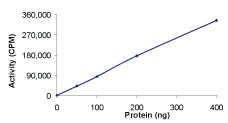
AKT2, Active
Recombinant full-length human AKT2 was expressed by baculovirus in Sf9 insect cells using a N-terminal GST tag.
Catalog No. A17-10G
| Catalog No. | Pack Size | Price (USD) | |
|---|---|---|---|
| A17-10G-05 | 5 ug | $226 | |
| A17-10G-10 | 10 ug | $325 | |
| A17-10G-BULK | BULK | Contact Us |


 AKT2, Active, A17-10H
AKT2, Active, A17-10H

 Toll Free: 1-866-954-6273
Toll Free: 1-866-954-6273 info@signalchem.com
info@signalchem.com